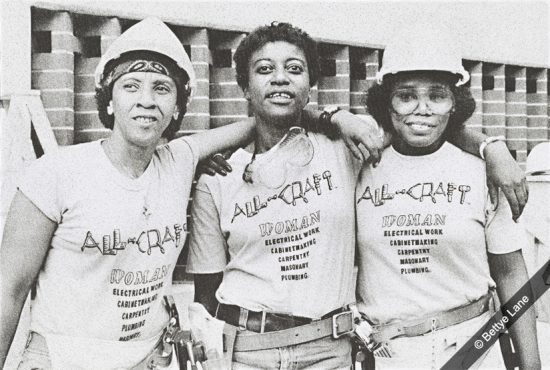Oregon Tradeswomen’s Executive Director Reflects on Women’s History Month
During the month of March in the United States, we officially celebrate women who’ve dedicated their lives to create a better future as “Women’s History Month”, tracing the event beginnings back to the first International Women’s Day in 1911.
We take this time to honor the many women in our nation’s history who fought for justice, equality, and equity, including Susan B. Anthony, Sojourner Truth, Lucy Stone, Lucretia Mott, Elizabeth Cady Stanton, Harriet Tubman, and Alice Paul. We honor our sisters in the labor movement who worked to ensure equal rights and equal pay in the workplace, such as Lucy Parsons, Mary Harris Jones, Leonora O’Reilly, Frances Perkins, Luisa Moreno, and Esther Peterson. We celebrate our sisters in more recent decades like Shirley Ware, Linda Chavez-Thompson, Mary Kay Henry, and others who continue to fight for our rights and for our future. We hold up the iconic symbol of our tradeswomen movement, Rosie the Riveter, reminding the world and ourselves, “We Can Do It!”.

Tradeswomen, 1981. © Bettye Lane
This month, Oregon Tradeswomen would like to take a moment to honor and acknowledge the incredible contributions tradeswomen make each and every day. Here in Portland, across our state, and throughout our nation, tradeswomen are still pioneers in industries like construction, transportation, manufacturing, and rail, working to care for their families and build our communities. Up early and home late, our sisters are not just working for a paycheck, they are working for change. They are active mentoring, volunteering, working in their unions, participating in committees, and serving as role models. They vote, they organize, they donate time, talent, and dollars to our tradeswomen movement to impact change. They raise their hands, their fists, and their voices. Yet often, our sisters are not heard.
In this era of #MeToo, we need to stand strong in our support of, and in solidarity with tradeswomen. For far too long, women working in our industry have experienced sexual harassment at an alarming rate, and often at great personal cost. According to a bipartisan 2016 report of the Co-Chairs of the EEOC Special Task Force on the Study of Harassment in the Workplace, 88 per cent of female construction workers experience sexual harassment at work, compared to 25 per cent of women in the general workforce. Women leave the construction sector at a faster rate than their male colleagues, according to a 2014 report by the National Women’s Law Center – noting that in some trades, 70 percent of women leave before completing their apprenticeship training program, compared to 53 percent of men. The women who leave point to hostile work environments and sexual harassment as reasons for exiting.
At Oregon Tradeswomen, we are working to change our industry and create a different future – not just for women, but for all of our workforce. We know that when worksites are equitable and respectful, all workers benefit, not just women. Industry benefits too – studies show a decrease in employee turnover, greater productivity, increased job satisfaction and loyalty, and overall improved performance. Our work includes the recent implementation of a new model for shifting jobsite culture, and is currently being implemented at the Multnomah County Courthouse project. This bystander intervention model is demonstrating promises outcomes in creating respectful worksites. It is providing tools for the construction workforce to speak up, speak out, and make a difference. We look forward to sharing more in the coming months on this model, and in the meantime, we ask you to join us in honoring tradeswomen not just this month, but every day.

Kelly Kupcak
Executive Director of Oregon Tradeswomen
